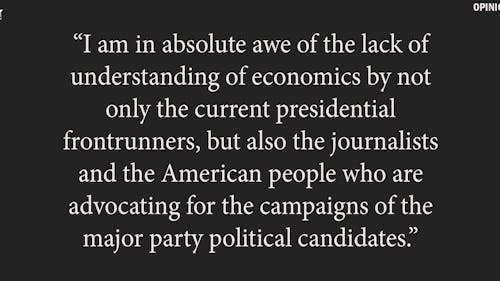DEMAREST: Candidates don't know how budgets work

Tensions are rising and the scrutiny of the two major presidential candidates — Hillary Clinton and Donald Trump — are finally becoming reasonable in terms of the questions they are being asked on how they are going to address the current economic climate of the United States.
The majority of the 2016 election has revolved a lot around finger-pointing, talk of past experiences with bad debts, legal gray areas and email servers. The candidates of every end of the political spectrum spoke in terms of their visions of where they would bring the country but lacked legitimate depth on planning out and describing their anticipated first days in the oval office.
Americans in recent months have grown tired of debating who has a more dreadful and consistently unreliable past that could disqualify the candidates from holding the office of President of the United States. And with the number of candidates holding legitimate standing in the presidential race dwindling down, the candidates are being forced to be more specific in displaying how these so called visions will unfold.
Donald Trump this past week spoke before the Economic Club of New York, an exclusive club made up American economists, academics and executives, and predicted his economic plan would produce an economic growth of 3.5 percent annually with the potential of 4 percent annually. This is a feat that was never matched through out the entirety of the Bush and Obama administrations.
The economic conference had a positive response on the day of Trump’s bold speech on the issues he claims to have been consistent on through out his campaign, but the lacking factor — through all of his ranting on tax cuts, building walls, more efficient use of cuts in education spending, infrastructure investment and penalties on trade agreement he intends to overhaul — was depth.
Neither candidate really does much talking about the definition of annual economic growth means and how it is calculated. They talk about a deficit improvement from the prior fiscal year, but don’t mention that deficit means how much we lost in the fiscal term not how much we decreased the deficit of the federal debt. That being said, if the deficit improves, that means we accrued less debt than the previous year, but it still means we lost money — and that we did not reach a surplus.
I am in absolute awe of the lack of understanding of economics by not only the current presidential frontrunners, but also the journalists and the American people who are advocating for the campaigns of the major party political candidates.
Literally no one is even talking about the reality of the situation, and it is even more frightening that the major news organizations would rather talk about who is or is not upset over a benched NFL quarterback sitting down during the National Anthem.
Just looking at the backgrounds of the candidates shows that they have little to no experience dealing with anything that has to do with analyzing cash flows at a macroeconomic level, publishing financial statements and, to my knowledge, they still are having some difficultly describing their relationship with the federal government — more commonly known as a "tax return."
Trump is without a doubt not qualified to oversee the treasury of our country, but Clinton is not even remotely appropriately qualified to do so either. The Democratic candidate’s educational background is in political science at the undergraduate level, and her graduate study was at Yale Law School. Following that, she never — and I emphasis never — held a position in any capacity that over saw the finances of a governing body.
In August, Clinton outlined her major economic standpoints in saying she wants to raise personal income taxes on high net worth individuals, raise taxes on certain corporate tax rate, strengthen trade penalties and cut education costs. Similar to her rival candidate's economic plan on numerous issues such as trade and education efficiency in spending, the plan still does not explicitly outline the cause to the effect.
Talking about things you think will save money is great and it helps the American people to understand where you fall in terms of what you see needs in improving, but like I said earlier, the disconnect is inexcusable.
The candidates need to really dial in specifically on what annual economic growth is, what gross domestic product is, and why things like efficiently education spending or strict trade agreements improve those metrics in particular. Give the American people a formula because it is the only way to quite literally prove that you — or any one you work with — know what you’re talking about.
Nicholas Demarest is a Rutgers Business School senior majoring in accounting. His column, “Tax and Turmoil,” runs on alternating Mondays.
YOUR VOICE | The Daily Targum welcomes submissions from all readers. Due to space limitations in our print newspaper, letters to the editor must not exceed 500 words. Guest columns and commentaries must be between 700 and 850 words. All authors must include their name, phone number, class year and college affiliation or department to be considered for publication. Please submit via email to oped@dailytargum.com by 4 p.m. to be considered for the following day’s publication. Columns, cartoons and letters do not necessarily reflect the views of the Targum Publishing Company or its staff.



